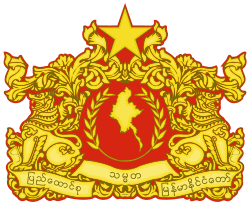Myanmar nationality law
Myanmar nationality law currently recognises three categories of citizens, namely citizen, associate citizen and naturalised citizen, according to the 1982 Citizenship Law.[1][2] Citizens, as defined by the 1947 Constitution, are persons who belong to an "indigenous race", have a grandparent from an "indigenous race", are children of citizens, or lived in British Burma prior to 1942.[3][4]
| Myanmar Citizenship Act | |
|---|---|
 | |
| Parliament of Myanmar | |
Long title
| |
| Enacted by | Government of Myanmar |
| Status: Current legislation | |
Under this law, citizens are required to obtain a National Registration Card (နိုင်ငံသားစိစစ်ရေးကတ်ပြား, NRC), while non-citizens are given a Foreign Registration Card (နိုင်ငံခြားသားစိစစ်ရေးကတ်ပြား, FRC). Citizens whose parents hold FRCs are not allowed to run for public office.[5]
Myanmar has a stratified citizenship system, similar to the distinction between US nationals and US citizenship. Burmese citizens' rights are distinctively different depending on the category they belong to and based on how one's forebearers acquired their own citizenship category.
- Full citizens are descendants of residents who lived in Burma prior to 1823 or were born to parents who were citizens at the time of birth.
- Associate citizens are those who acquired citizenship through the 1948 Union Citizenship Law.
- Naturalized citizens are those who lived in Burma before 4 January 1948 and applied for citizenship after 1982.
Dual citizenship
Dual citizenship is not recognised by Myanmar.
Naturalisation
Foreigners can become naturalised citizens of Myanmar, if they can prove a close familial connection to the country. Foreigners who have been in the country since 1948 can also apply for nationality. They can also apply if they have married a Myanmar national. [6]
Rohingya citizenship
The law does not recognise Rohingyas as one of the 135 legally recognised ethnic groups of Myanmar,[7] thus denying most of them Myanmar citizenship.[8] The official stance of the Government of Myanmar is that the Rohingya peoples are citizens of Bangladesh, as a result of the British partitioning of their Asian possessions.
References
- Tun Tun Aung (March 2007). "An Introduction to Citizenship Card under Myanmar Citizenship Law" (PDF). 現代社會文化研究 (38): 265–290. Archived from the original (PDF) on 14 May 2014.
- "Burma Citizenship Law". Government of Burma. UNHCR. 15 October 1982. Retrieved 15 March 2012.
- https://www.researchgate.net/publication/319115344_Rohingyas_The_People_for_Whom_No_One_Is_Responsible
- https://www.researchgate.net/publication/272026723_The_Rohingya_Refugees_in_Bangladesh_A_Vulnerable_Group_in_Law_and_Policy
- Soe Than Lynn; Shwe Yinn Mar Oo (20 September 2010). "Citizenship criteria trips up election candidates". Myanmar Times. Archived from the original on 13 March 2012. Retrieved 15 March 2012.
- file:///C:/Users/PAEPublic/Downloads/MMR87413.pdf
- "Myanmar's Rohingya". The Economist. 20 October 2012. Retrieved 3 February 2017.
- "Why Buddhists and Muslims in Rakhine state in Myanmar are at each others' throats". The Economist. 3 November 2012. Retrieved 3 February 2017.